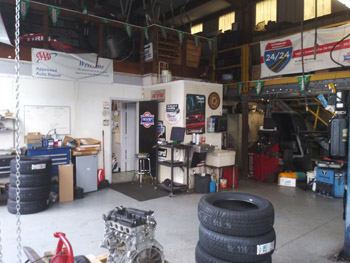Featured

[/image]
Brakes are probably the most crucial safety and security attribute of any automobile. Without reliable brakes, even the most effective auto can come to be a risk when traveling. That's why regular brake inspections are a should for guaranteeing your automobile stops when you require it to. Complying with an appropriate brake inspection timetable can not only maintain you safe yet likewise help you prevent pricey repair services. Right here's a detailed overview on exactly how to properly check your brakes and what to look out for.
- The Value of Regular Brake Inspections. Brakes go through continual deterioration with every usage, whether you're driving at broadband on the freeway or cruising through city roads. Over time, brake pads, blades, and various other parts use down, which can impact braking performance. Without regular examinations, you might not notice the gradual reduction in effectiveness until it's far too late.
Regular brake inspections permit you to capture issues early, making certain that your brakes continue to be responsive, reliable, and safe. Timely examinations can additionally save you cash by dealing with small problems before they end up being pricey repairs.
- Typical Signs That Your Brakes Required Interest. While regular brake assessments are essential, there are some caution indications you can watch out for to understand when it's time to set up a check-up:
Squealing or Grinding Seems: Shrill squeaks or grinding sounds when using the brakes are commonly indications that your brake pads are worn and need replacement. Vibration or Pulsation: If you really feel vibrations in the steering wheel or the brake pedal, it might show warped rotors, which may require resurfacing or replacing. Soft or Squishy Brake Pedal: If the brake pedal feels abnormally soft or mushy, there may be air in the brake lines or an issue with the master cyndrical tube. Drawing away: If your vehicle draws away while stopping, this might be created by irregular brake pad wear or an issue with the brake liquid. Increased Stopping Distance: If it takes longer to quit than typical, it might show that the brake pads are used, the fluid is low, or the rotors are damaged. If you see any of these symptoms, it's ideal to have your brakes evaluated instantly.

- Trick Elements Checked Throughout Brake Inspections. During a brake examination, a professional will certainly examine numerous important parts of the braking system to make certain whatever is working effectively. Below are the vital components entailed:
Brake Pads: One of the most common reason for inadequate stopping performance is worn-out brake pads. Checking the thickness of the pads is a priority during every inspection. Brake Rotors: Rotors must be smooth and complimentary of grooves or cracks. Any kind of substantial damage to the rotors could lead to compromised stopping efficiency and unequal pad wear. Brake Liquid: Reduced or contaminated brake liquid can harm braking efficiency. The professional will certainly examine the fluid degrees and quality and replace it if required. Brake Lines and Tubes: Brake lines need to be without leaks or fractures. Any damages to the lines can lead to loss of brake fluid, causing brake failing. Brake Calipers: The calipers apply pressure to the brake pads. They need to be checked for indications of wear or leakages to guarantee they are working appropriately. On a regular basis inspecting these parts assists maintain your brake system in peak problem, allowing you to quit your automobile securely and effectively.
- Exactly how Usually Should You Have Your Brakes Evaluated? The basic recommendation is to have your brakes evaluated at the very least yearly or every 12,000 miles, relying on your driving routines. Particular driving conditions may call for even more frequent assessments:
Rush Hour: If you typically drive in stop-and-go website traffic, your brake pads will use down much faster. Hill Driving: Driving on high roads needs more frequent stopping, which can trigger your brakes to wear a lot more quickly. Towing or Hauling Heavy Loads: If you frequently carry heavy loads, your brakes will experience much more tension and call for more frequent examinations. If you discover any one of the indication discussed earlier, don't wait for the next scheduled assessment-- have your brakes inspected promptly.
- The Repercussions of Neglecting Brake Inspections. Ignoring normal brake evaluations can lead to significant repercussions. A falling short brake system could result in reduced stopping power, which raises your risk of crashes.
In the most awful situation, driving with harmed brakes can result in finish brake failure, placing you and other motorists at danger. Normal brake examinations are a tiny financial investment that can conserve your life and protect against pricey fixings.
- Final Thought: Keep Safe with Regimen Brake Inspections. Brakes are not something you intend to take chances with. A trusted braking system is necessary for safe driving, and normal brake assessments are a straightforward way to make sure that your car quits when you need it most. By remaining on top of brake maintenance, enjoying for advising indicators, and having your brakes examined at the recommended intervals, you'll safeguard both your lorry and your safety and security.
Don't wait till your brakes start to fall short-- timetable normal brake evaluations and keep your car in ideal problem for several years to find.
Latest Posts
Find Out Save Big on Car Maintenance with Montclare Auto Repair’s Special Deals
Explore WyHy Federal Credit Union – Essential Perks for Your Financial Success
Discover WyHy FCU – Key Advantages for Your Future